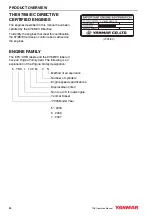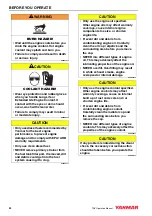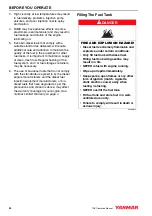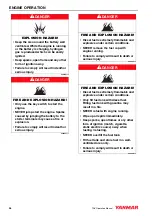
BEFORE YOU OPERATE
TNV Operation Manual
33
DIESEL FUEL
Diesel Fuel Specifications
Diesel fuel should comply with the following
specifications. The table lists several worldwide
specifications for diesel fuels.
Additional Technical Fuel Requirements
• The fuel cetane number should be equal to 45
or higher.
• The sulfur content must not exceed 0.5% by
volume. Less than 0.05% is preferred.
• Bio-Diesel fuels.
page 33
• NEVER mix kerosene, used engine oil, or
residual fuels with the diesel fuel.
• Water and sediment in the fuel should not
exceed 0.05% by volume.
• Keep the fuel tank and fuel-handling equipment
clean at all times.
• Poor quality fuel can reduce engine
performance and / or cause engine damage.
• Fuel additives are not recommended. Some
fuel additives may cause poor engine
performance. Consult your Yanmar
representative for more information.
• Ash content not to exceed 0.01% by volume.
• Carbon residue content not to exceed 0.35% by
volume. Less than 0.1% is preferred.
• Total aromatics content should not exceed 35%
by volume. Less than 30% is preferred.
• PAH (polycyclic aromatic hydrocarbons) content
should be below 10% by volume.
• Metal content of Na, Mg, Si, and Al should be
equal to or lower than 1 mass ppm. (Test
analysis method JPI-5S-44-95)
• Lubricity: Wear mark of WS1.4 should be Max.
0.018 in (460
µ
m) at HFRR test.
Bio-Diesel Fuels
In Europe and in the United States, as well as
some other countries, non-mineral oil based fuel
resources such as RME (Rapeseed Methyl Ester)
and SOME (Soybean Methyl Ester), collectively
known as FAME (Fatty Acid Methyl Esters), are
being used as extenders for mineral oil derived
diesel fuels.
Yanmar approves the use of bio-diesel fuels that
do not exceed a blend of 5% (by volume) of
FAME with 95% (by volume) of approved mineral
oil derived diesel fuel. Such bio-diesel fuels are
known in the marketplace as B5 diesel fuels.
These B5 diesel fuels must meet certain
requirements.
1. The bio-fuels must meet the minimum
specifications for the country in which they
are used.
• In Europe, bio-diesel fuels must comply with
the European Standard EN14214.
• In the United States, bio-diesel fuels must
comply with the American Standard ASTM
D-6751.
2. Bio-fuels should be purchased only from
recognized and authorized diesel fuel
suppliers.
Precautions and concerns regarding the use
of bio-fuels:
1. Free methanol in FAME may result in
corrosion of aluminum and zinc FIE
components.
2. Free water in FAME may result in plugging of
fuel filters and increased bacterial growth.
Diesel Fuel Specification
Location
No. 2-D, No. 1-D, ASTM D975-94
USA
EN590:96
European Union
ISO 8217 DMX
International
BS 2869-A1 or A2
United Kingdom
JIS K2204 Grade No.2
Japan
KSM-2610
Korea
GB252 China
Содержание 2TNV70
Страница 1: ......
Страница 2: ......
Страница 32: ...SAFETY 14 TNV Operation Manual ...
Страница 116: ...PERIODIC MAINTENANCE 98 TNV Operation Manual ...
Страница 140: ...SPECIFICATIONS 122 TNV Operation Manual ...
Страница 141: ......
Страница 142: ......






























